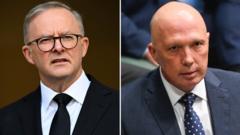With the federal election fast approaching, Australia faces significant economic challenges as Anthony Albanese's Labor Party defends its position against a competitive opposition.
Australia Sets Federal Election Date for May 3

Australia Sets Federal Election Date for May 3
Voters Prepare for a Pivotal Election Amid Rising Cost-of-Living Issues
Australia's Prime Minister Anthony Albanese has officially announced that federal elections will be held on May 3. This crucial date comes as Albanese’s Labor Party, which currently holds a three-seat advantage, prepares to defend its standing against opposition leader Peter Dutton of the Liberal-National Coalition. Following a meeting with the Governor-General in Canberra, the Prime Minister emphasized the importance of the imminent campaign, which opinion polls show to be tightly contested.
As Australian voters gear up for the election, the cost-of-living crisis has emerged as the predominant concern. Housing affordability and food prices have topped the list, while access to healthcare remains a critical issue. Rising crime rates and record immigration levels are also surging up the public agenda, highlighting a complex web of concerns facing the electorate. Despite climate action being a central theme during the last election, its significance endures as many Australians still demand substantial environmental policies.
In response to these pressing issues, Albanese has laid out initiatives aimed at alleviating financial strains, such as expanding free medical visits and introducing modest tax reductions. He warns that choosing Dutton could revert progress, while Dutton counters with his party’s promises to restore Australia to a favorable path by emphasizing crime control and economic improvement.
Traditionally, Australian politics has been dominated by the Labor Party and the Liberal-National Coalition, each vying for at least 76 of the 150 seats in the House of Representatives to secure governance. Albanese's leadership, which began in 2022 after a tumultuous decade of unstable prime ministerial transitions, faced significant challenges from the outset.
Despite promises of a unified and ethical administration, and introducing enhanced emissions reduction legislation following heated climate debates, Albanese's government is experiencing turbulence amid global economic pressures affecting the nation's citizens. His attempt to secure constitutional recognition for Aboriginal Peoples failed in a recent referendum, adding further complexities to his administration's challenges.
On the other end, Dutton's background as a police officer and seasoned politician presents a figure prepared to tackle these issues head-on. Known for his blunt approach to policy and governance, he faces scrutiny over his past positions on various societal issues while attempting to redefine his image as he positions himself for a competitive electoral battle. As the election date approaches, the political landscape remains charged, with each party striving to resonate with the concerns of Australian citizens.





















